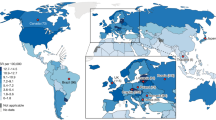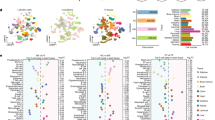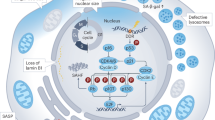Abstract
The role of the nuclear peroxisome proliferator–activated receptor (PPAR)-γ in cancer has been a subject of debate. The identification of loss-of-function mutations in PPARG in colon and prostate tumors has led to the idea that this gene may function as a tumor suppressor. We have directly tested this notion using a mouse model of prostate cancer. Neither hemizygous deletion of Pparg nor complete ablation of Ppara influenced the development of prostate cancer in our experimental context.
This is a preview of subscription content, access via your institution
Access options
Subscribe to this journal
Receive 12 print issues and online access
$209.00 per year
only $17.42 per issue
Buy this article
- Purchase on Springer Link
- Instant access to full article PDF
Prices may be subject to local taxes which are calculated during checkout

Similar content being viewed by others
References
Lefebvre, A.M. et al. Nat. Med. 4, 1053–1057 (1998).
Saez, E. et al. Nat. Med. 4, 1058–1061 (1998).
Sarraf, P. et al. Nat. Med. 4, 1046–1052 (1998).
Sarraf, P. et al. Mol. Cell 3, 799–804 (1999).
Mueller, E. et al. Proc. Natl. Acad. Sci. USA 97, 10990–10995 (2000).
Huss, W.J., Maddison, L.A. & Greenberg, N.M. Semin. Cancer Biol. 11, 245–260 (2001).
Collett, G.P. et al. Clin. Cancer Res. 6, 3241–3248 (2000).
Paltoo, D. et al. Cancer Lett. 191, 67–74 (2003).
Acknowledgements
This work was supported by CaP CURE and the Howard Hughes Medical Institute. The experiments were conducted in accordance with National Institutes of Health guidelines, with the approval of The Salk Institute's animal care committee. R.M.E. is an Investigator of the Howard Hughes Medical Institute for Biological Studies and March of Dimes Chair in Molecular and Developmental Biology.
Author information
Authors and Affiliations
Corresponding author
Ethics declarations
Competing interests
The authors declare no competing financial interests.
Rights and permissions
About this article
Cite this article
Saez, E., Olson, P. & Evans, R. Genetic deficiency in Pparg does not alter development of experimental prostate cancer. Nat Med 9, 1265–1266 (2003). https://doi.org/10.1038/nm928
Received:
Accepted:
Published:
Issue Date:
DOI: https://doi.org/10.1038/nm928



